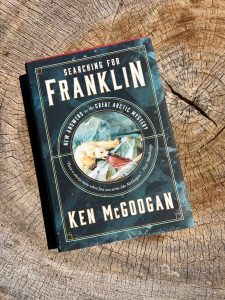There are five books on the 2024 J.W. Dafoe Book Prize shortlist and today we’re going to highlight Ken McGoogan’s Searching for Franklin: New Answers to the Great Arctic Mystery (Douglas & McIntyre).
Here’s a Q&A with Ken McGoogan.
What were your goals for this book?
 Urged on by the late Louie Kamookak, the Inuit oral historian, and having already written five books about the north, I decided finally to tackle the best-known figure in Arctic exploration history. Who was John Franklin? What was the root cause of the catastrophe that befell his 1845 expedition? I wanted to remind people of Franklin’s centrality — that the decades-long search for him and his two lost ships established Canada’s claim to the archipelago north of continental North America. But for the Franklin search, and the mapping it entailed, all that territory — what we know as the Canadian Arctic — would belong to Russia or else to the US, which managed to wrest control of Alaska.
Urged on by the late Louie Kamookak, the Inuit oral historian, and having already written five books about the north, I decided finally to tackle the best-known figure in Arctic exploration history. Who was John Franklin? What was the root cause of the catastrophe that befell his 1845 expedition? I wanted to remind people of Franklin’s centrality — that the decades-long search for him and his two lost ships established Canada’s claim to the archipelago north of continental North America. But for the Franklin search, and the mapping it entailed, all that territory — what we know as the Canadian Arctic — would belong to Russia or else to the US, which managed to wrest control of Alaska.
What have you learned about your process while working on this project? Or is every project unique….
This book is Exhibit A in a larger project I call Let’s Make History Exciting Again. Canadian History has disappeared as a core subject from our schools and universities. Those who write history can best respond by revitalizing the way we do it. As the most conservative of literary genres, History insists on chronological linearity. Start at the beginning and then and then and then. Contemporary readers, exposed to dazzling narrative techniques in fiction, theatre, and film, find this deadly dull. Enough! I am calling for a creative-nonfiction revolution. In Searching for Franklin, I establish a contemporary frame and cut back and forth between two historical narratives. How is that for radical? Clearly, my process has turned me into a wild-eyed revolutionary.
What books were important to you while you were writing this book? Who/what are your influences?
I recently wrote a longish blogpost entitled The Best Books About What Happened to the Lost Franklin Expedition. I cited Frozen in Time and Unravelling the Franklin Mystery, as well as a collection of letters, an early biography of Jane Franklin, and the journal of Danish explorer Jens Munk. With this book, I am also building on my five previous works about Arctic exploration. My influences? Subject Matter: Pierre Berton, Peter C. Newman. Personal engagement: Jack Kerouac, Farley Mowat, Leonard Cohen. Political vision: Margaret Atwood, George Orwell. Literary craft: James Joyce, Mordecai Richler, Doris Lessing, Julio Cortazar, Quentin Tarantino, Christopher Nolan.
Tell me a bit about why you write about “Canada, Canadians and the nation in international affairs.” Why is it important to you?
I don’t know why I am so passionate about Canada. But, yes, I do see that I have written six books on Arctic exploration and five whose titles or subtitles include the words Canada or Canadian. Maybe I have been trying to figure out what it means to be Canadian and where we fit in the wider world. My roots are mainly Scottish and French. I grew up in a francophone resort town on Lake of Two Mountains and traveled to school by bus with Mohawks from Oka (Kanesatake). I have visited all ten provinces and three territories; lived for three or more years in Montreal, Toronto, Calgary, Vancouver, and Guelph; and sojourned for months in Halifax, Dawson City, Nelson, Fredericton, and Banff. I have taken my Canadian self to New York, California, Scotland, Ireland, England, continental Europe, Australia, Tanzania, Mexico, India, Sri Lanka. I am still on the road and looking for answers.
What are you reading right now? What are you writing right now?
I have been devouring political books about our current predicament. To name a few: Stephen Marche, The Next Civil War; Liz Cheney, Oath and Honor; Rachel Maddow, Prequel: An American Fight Against Fascism; Barbara F. Walter, How Civil Wars Start. As for writing, I am finishing up a book called Shadows of Tyranny: Defending Democracy in an Age of Dictatorship. In it, funnily enough, I reference J.W. Dafoe. “When in 1938 [William Lyon Mackenzie} King hailed the Munich Agreement, which ceded to Hitler an important part of Czechoslovakia (the Sudetenland), Winnipeg journalist J.W. Dafoe — who had repeatedly warned against Hitler’s hate-filled rhetoric — wrote a scathing editorial in which he denounced the appeasers for validating “the doctrine that Germany can intervene for racial reasons for the ‘protection’ of Germans on such grounds as she thinks proper in any country in the world.” How is that for ringing contemporary?
The winner of the J.W. Dafoe Book Prize, now valued at $12,000, will be named June 10.

